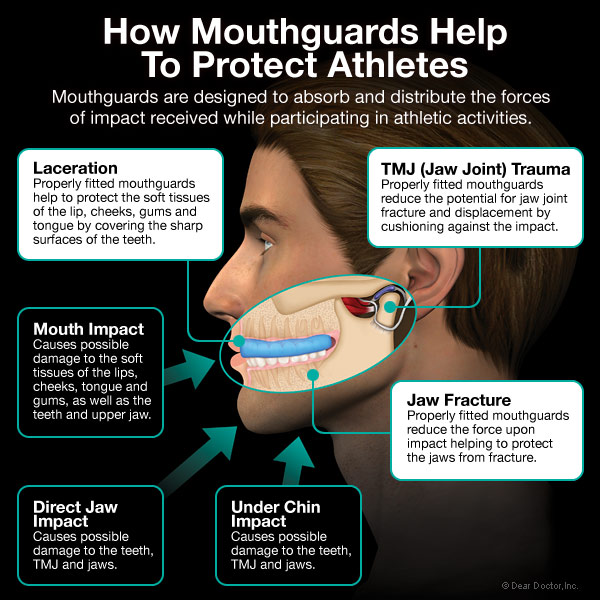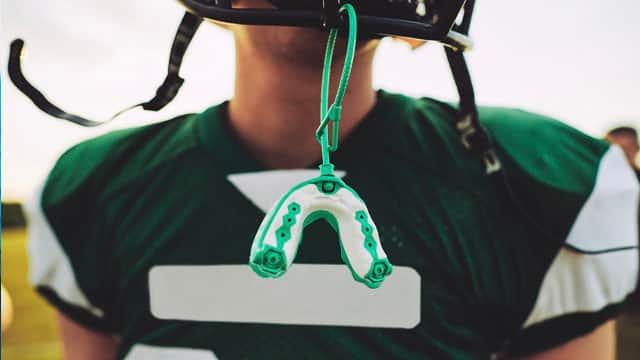Mouthguard Use in Sports: Protecting Athletes’ Oral Health
Do you know how important it is to protect your teeth while playing sports?
Mouthguard use in sports is crucial for safeguarding athletes’ oral health. Whether you’re playing football, basketball, or any other high-impact sport, wearing a mouthguard can help prevent serious dental injuries.
This short guide will provide you with everything you need to know about mouthguards – from the benefits of using them to choosing the right one for your sport.
We’ll also discuss how to properly care for and maintain your mouthguard, as well as ways to promote mouthguard use among athletes.
So, let’s dive in and learn how to keep your smile safe on the field or court!
Key Takeaways
– Mouthguards protect teeth and jaw from fractures, chipped teeth, and tooth loss, reduce the risk of jaw fractures and dislocations, and prevent cuts, bruises, and lacerations to lips, cheeks, and tongue.
– Mouthguards provide protection against accidental biting during sports activities and help prevent concussions by absorbing impact forces.
– There are three types of mouthguards for sports: stock mouthguards, boil-and-bite mouthguards, and custom-made mouthguards.
– When choosing a mouthguard, prioritize proper fit and protection, look for comfort and the ability to speak and breathe properly.
Benefits of Using Mouthguards
Wearing a mouthguard can provide you with several key benefits when participating in sports. First and foremost, a mouthguard serves as a protective barrier for your teeth and jaw. By cushioning the impact of blows to the face, it can help prevent tooth fractures, chipped teeth, and even tooth loss. Moreover, a mouthguard can also reduce the risk of jaw fractures and dislocations by absorbing and distributing the force of a hit.
In addition to protecting your teeth and jaw, wearing a mouthguard can also help prevent injuries to your soft tissues. It acts as a cushion between your lips, cheeks, and tongue, and the sharp edges of your teeth, reducing the chances of cuts, bruises, and lacerations. Furthermore, a mouthguard can also provide a layer of protection for your lips and cheeks against accidental biting during intense sports activities.
Another benefit of wearing a mouthguard is that it can help prevent concussions. By absorbing and dissipating the impact forces transmitted through your jaw and skull, it can reduce the risk of a concussion in case of a blow to the face or head. This can be particularly important in high-contact sports such as football, hockey, and boxing.
Types of Mouthguards for Sports
To ensure maximum protection for your teeth and jaw while participating in sports, it’s important to consider the different types of mouthguards available.
There are three main types of mouthguards: stock mouthguards, boil-and-bite mouthguards, and custom-made mouthguards.
Stock mouthguards are the most common and affordable option. They come pre-formed and ready to use, but they may not provide the best fit or comfort.
Boil-and-bite mouthguards, on the other hand, offer a more personalized fit. You simply boil the mouthguard, let it cool slightly, and then bite into it to shape it to your teeth and jaw. This type of mouthguard is available at most sporting goods stores and provides a better fit than stock mouthguards.
For the highest level of protection and comfort, custom-made mouthguards are the recommended choice. These mouthguards are designed specifically for your teeth and jaw by a dental professional. Although they’re more expensive, they offer the best fit and protection against dental injuries. Custom-made mouthguards can be obtained by visiting your dentist and having impressions taken of your teeth.
How to Choose the Right Mouthguard
When selecting a mouthguard, prioritize the proper fit and protection it offers to ensure optimal oral health during sports activities. A well-fitted mouthguard should cover your teeth and gums snugly, providing a barrier against impact and reducing the risk of dental injuries.
Look for a mouthguard that’s comfortable to wear and doesn’t impede your ability to speak or breathe properly.
There are three main types of mouthguards to choose from: stock mouthguards, boil-and-bite mouthguards, and custom-made mouthguards.
Stock mouthguards are ready-to-wear and come in various sizes, but they may not provide the best fit.
Boil-and-bite mouthguards can be customized by softening them in hot water and then molding them to your teeth. They offer a better fit than stock mouthguards but may still not be as precise as custom-made ones.
Custom-made mouthguards, made by a dental professional, are the most expensive option but offer the best fit and protection. They’re individually designed to match your teeth and provide maximum comfort and coverage.
Proper Care and Maintenance of Mouthguards
After choosing the right mouthguard, it’s important to properly care for and maintain it. By following a few simple steps, you can ensure that your mouthguard remains clean, hygienic, and effective in protecting your oral health.
First and foremost, always rinse your mouthguard with cool water before and after each use. This will help remove any debris or bacteria that may have accumulated.
Additionally, it’s crucial to clean your mouthguard thoroughly using a non-abrasive toothbrush and mild soap. Avoid using toothpaste, as it can be too abrasive and damage the mouthguard’s material. After cleaning, make sure to rinse it thoroughly and allow it to air dry completely before storing it in a protective case.
Speaking of storage, always keep your mouthguard in a clean, dry place, away from direct sunlight or extreme temperatures.
Finally, regularly check your mouthguard for any signs of wear and tear, such as cracks or loose material. If you notice any damage, it’s essential to replace your mouthguard immediately to ensure optimal protection.
Promoting Mouthguard Use Among Athletes
Wear a properly fitted mouthguard during all high-risk sports activities to ensure optimal protection for your oral health. As an athlete, it’s crucial to prioritize your safety and well-being. By using a mouthguard, you can significantly reduce the risk of dental injuries and related oral health issues.
To promote mouthguard use among athletes, it’s important to raise awareness about the benefits and importance of wearing one. Coaches, trainers, and sports organizations should actively educate athletes about the potential risks of not using a mouthguard and the potential consequences of dental injuries.
Furthermore, athletes should be encouraged to choose a mouthguard that fits properly and comfortably. Custom-fitted mouthguards are often recommended as they provide the best protection and ensure a comfortable fit. Athletes should also be informed about the proper care and maintenance of their mouthguards to ensure their longevity and effectiveness.
Sports teams and organizations can also play a role in promoting mouthguard use by making it a mandatory requirement for participation in high-risk sports activities. This can help create a culture of safety and emphasize the importance of oral health protection.
Frequently Asked Questions
Are Mouthguards Only Necessary for Contact Sports?
Mouthguards aren’t only necessary for contact sports. They provide protection for your teeth and mouth during various athletic activities. Even non-contact sports like gymnastics or skateboarding can lead to accidental impacts or falls that may cause dental injuries.
Wearing a mouthguard can help prevent chipped, broken, or knocked-out teeth, as well as cuts to the lips and tongue. So, it’s important to consider using a mouthguard whenever you engage in any physical activity that puts your mouth at risk.
Can Wearing a Mouthguard Improve Athletic Performance?

Wearing a mouthguard can improve your athletic performance. It not only protects your teeth and mouth from injuries, but it also helps with your overall performance.
By wearing a mouthguard, you can feel more confident and focused on your game, without worrying about dental injuries. It can also reduce the risk of concussions and other head injuries.
Is It Safe for Children to Use Mouthguards?
Yes, it’s safe for children to use mouthguards. They provide crucial protection for their teeth and mouth during sports activities.
Mouthguards help prevent dental injuries, such as broken teeth or jaw fractures, which can be painful and costly to fix.
By wearing a mouthguard, your child can enjoy playing sports while reducing the risk of oral injuries.
Make sure to choose a properly fitted mouthguard for optimal comfort and protection.
Can Mouthguards Prevent Concussions?
Mouthguards are designed to protect your teeth and mouth from injuries during sports activities, but can they also prevent concussions?
While mouthguards provide some cushioning and help absorb impact, they’re primarily designed to prevent dental injuries rather than concussions.
To reduce the risk of concussions, it’s crucial to wear proper headgear specifically designed for that purpose, such as helmets.
How Often Should Mouthguards Be Replaced?
How often should you replace mouthguards?
It’s important to regularly replace mouthguards to ensure they provide optimal protection. Over time, mouthguards can become worn, lose their shape, and become less effective. Experts recommend replacing them every six months or sooner if they show signs of wear and tear.
Conclusion
So remember, using a mouthguard is essential for protecting athletes’ oral health during sports.
By choosing the right mouthguard and properly caring for it, you can ensure maximum protection and reduce the risk of dental injuries.
Promote mouthguard use among athletes to prioritize their well-being and maintain their w read this article inning smiles.
Take the necessary steps to safeguard their oral health and enjoy the benefits of a healthy and confident sports experience.

Welcome to my website! I’m Declan Gaffney, a dedicated and passionate Preventive Dentist with years of experience in promoting oral health and providing top-notch dental care. I am thrilled to share my knowledge and expertise with you through this platform.

